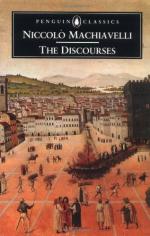
|
| Name: _________________________ | Period: ___________________ |
This quiz consists of 5 multiple choice and 5 short answer questions through Book Two, The Growth of Rome's Empire, The Army, Its Discipline and Component Parts, The Administration of Conquered Territory and Other Problems Which Admit of No Middle Course, Mistakes Often Made in Connection With War, Rome's Dealings With Neighboring.
Multiple Choice Questions
1. What does Machiavelli consider one of the most important reasons the Roman Empire was successful in expanding its borders?
(a) It kept Citizens in poverty.
(b) It had laws that kept the Plebes in their place.
(c) It showed skill in placing Nobles in control over colonies.
(d) The Senate gave great authority to military leaders over Cities that Rome was attacking.
2. What does Machiavelli believe inspired the expansion of the Roman Empire?
(a) Aggression and murder.
(b) Virtue.
(c) Harsh Captains guiding the military.
(d) Keeping Citizens in poverty.
3. What does Machiavelli claim new sects (religions) do as they rise to prominence?
(a) Influence Citizens to be obedient to the Prince.
(b) Influence the culture to defy the Prince.
(c) Cause Citizens to avoid fighting in wars.
(d) Destroy all the signs, including language, of the old sects they come to dominate.
4. According to Machiavelli, what is the first thing that Citizens seek when starting on the path of chasing their ambitions?
(a) A cause that will incite the passions of the general masses.
(b) Not to be harmed by citizens or magistrates.
(c) The support of a wealthy Noble.
(d) Means to win access to public office.
5. What, according to Machiavelli in Book , 1 Section 38, is the fate of irresolute Republics?
(a) They will eventually fade away and reemerge as a tyranny.
(b) They cannot settle conflicts except with force because their weakness prevents them from resolving doubts over issues.
(c) They face invasion, destruction and anhilation.
(d) They have no alternative but to join alliances with powerful Republics that will take control of them.
Short Answer Questions
1. What is another method that Machiavelli reports leaders use to offend their citizens?
2. How did Machiavelli report that the Nobles controlled the process of Plebes having the opportunity to choose Plebes for four Tribunes?
3. What does Machiavelli claim causes ingratitude from a conquered citizenry?
4. What is an obvious counterpoint to Machiavelli's assertion to the benefits of the power of the Caesars to the Roman Empire?
5. What were placed to the right and the left of every battle line of the Roman army?
|
This section contains 504 words (approx. 2 pages at 300 words per page) |

|




